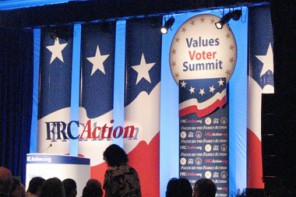From September 12th -14th the third annual Values Voter Summit took place in Washington, D.C., organized by FRC Action, Alliance Defense Fund and the High Impact Leadership Coalition, among others. The organizers sought to bring together church leaders, “cultural impact teams” from religious congregations, individuals, families and students to galvanize the “values voter” identity and to call those assembled to action.
The rise of the values voter—a calculated misnomer—coincides with the resurgent sense of the “moral awakening in America” and the need to fight against the perceived attack on Judeo-Christian values. According the numerous speakers at the Summit, these values are fundamental and God-given, passed on through the generations from parent to child, pastor to parishioner. They cautioned that a “culture war” has emerged, and the righteous must prepare to engage in battle.
Fundamental to the identity of the “values voter” is an allegiance to God above all else and a citizenship in God’s kingdom before country. Former Redskins coach Joe Gibbs spoke of God as the “head coach” and the bible as the game plan. Biblical references indeed have been used to serve as a guide to civic engagement. Literature in the Focus on the Family Action tool kit cites scriptural mandates for such action in James 2:17, “faith without action is dead,” and Proverbs 14:34 “righteousness exalts a nation.”
The Family Research Council encourages the formation of “cultural impact teams” in religious congregations, calling upon Matthew 5:13-16, “You are the Salt of the earth… you are the light of the world”—the values voter is to be a “stinging and healing preservative in a decaying culture, flavoring it with good and creating a thirst for God.”
Historically the central issues for the values voters have revolved around homosexuality and same-sex marriage, family structures, parental rights, abortion, and religious liberty. However, during the Friday morning plenary session at the Summit, Lou Dobbs of CNN encouraged the values voters not to “cloister around two or three issues,” but to broaden their scope of concern.
Bishop Harry Jackson and Tony Perkins explained their vision of an expanded right wing repertoire to include immigration and environmental concerns, among others, in their book, Personal Faith, Public Policy, also available for signing at the Summit. And if you had any doubts about the how this constellation of issues should come together for the values voter, Bishop Harry Jackson offered this clarification when he addressed the Summit: “being a Christian will make you conservative, but being a conservative will not make you a Christian.” According to his interpretation, the only righteous expression of faithfulness is through allegiance to a conservative political orientation. Clearly, the political path of the values voter seems to narrow further and further with each turn.
Translating the principles and beliefs derived from one’s faith into action in the public sphere, is nothing new, certainly not in the context of the United States with a rich history of religious pluralism that informs our citizenry. However, the manner in which this relationship is taking form contemporarily differs dramatically. The emergence not only of organizations such as Family Research Council, but their own political arms, such as FRC Action, mark a more focused effort by the religious Right to galvanize their constituents and assure their place within the political arena.



